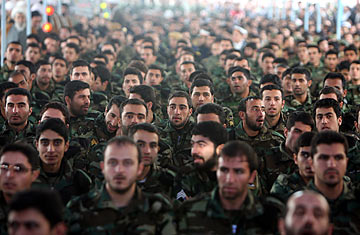
Members of Iran's Revolutionary Guards attend the first day of celebrations marking the anniversary of the Islamic revolution at the Behesht-e Zahra cemetery in southern Tehran
On Monday, Secretary of State Hillary Clinton finally got around to acknowledging what a lot of people have known since Iran's contested election last June — there's been a military takeover in that country, with the Islamic Revolutionary Guards Corps (IRGC) grabbing every important lever of power. As Clinton put it during a televised town-hall meeting, "The Supreme Leader, the President [and] the parliament is being supplanted, and Iran is moving toward a military dictatorship."
No doubt one reason it took Clinton so long to admit that the mullahs have been forced to cede power to the IRGC, Iran's élite military force, is that Washington hates to be the bearer of bad news, especially news that moves us closer to war.
Since its birth in 1979, the IRGC has been the hardest of the hard core of Ayatullah Khomeini's Islamic revolution. It thrives in confrontation with the U.S. and Israel, and does even better when Iran is at war. The IRGC looks at the 1982-2000 war in Lebanon as its most glorious moment, when its proxy Hizballah forced the West and Israel out of Lebanon. It left Hizballah with the enviable reputation of being the only force in the Middle East to have beaten both the West and Israel. Not to mention that Hizballah is now the de facto government in Lebanon. No wonder the IRGC would like an encore in the West Bank and Gaza, where it has been arming militants for more than a decade.
It may make us feel better to label the IRGC as a terrorist organization, but it's more instructive to look at things from the IRGC's perspective. It truly believes that its brand of asymmetrical warfare can defeat a modern, well-equipped force in a limited war. It did so in Lebanon, and given the right circumstances, it would do so in other parts of the Middle East. But the real point is that in a limited war with the U.S. and Israel, the IRGC could predominate, or at least wear us down to the point that we would decide it's better to settle.
With inflation and unemployment running at 30% in Iran, continuing demonstrations in the country and shaky oil markets, the Obama Administration should be considering the distinct possibility that the IRGC may welcome an open conflict with the U.S. (and Israel), its coup d'état solidified.
The most certain route to bringing the world down on its head would be for the IRGC to keep building centrifuges and enriching uranium. If nothing else, the hostility of the West that would follow would distract the Iranian opposition. And while an Israeli strike on Iran's nuclear facilities could perhaps set back the program by five years, it's a small price to pay in order to convince the people on the street that Iran is under an existential threat. One thing that would happen is that opposition demonstrations would come to a quick end.
The Obama Administration is talking about putting more sanctions on the IRGC, with hopes that a reluctant China might be willing to sign on to a more targeted effort. But this is a silly and hollow gesture — the IRGC is the best sanctions buster in the world. What Washington should be thinking about, now that crazy mullahs have been replaced by cunning generals, is how you negotiate with a military dictatorship. Unlike faith-based regimes, military ones have objectives, ones they are willing to negotiate and compromise on. We've certainly been through it before. The question is whether this Administration understands that punitive strikes don't intimidate beasts like the IRGC.
Baer, a former CIA field officer assigned to the Middle East, is TIME.com's intelligence columnist and the author of See No Evil and, most recently, The Devil We Know: Dealing with the New Iranian Superpower.
